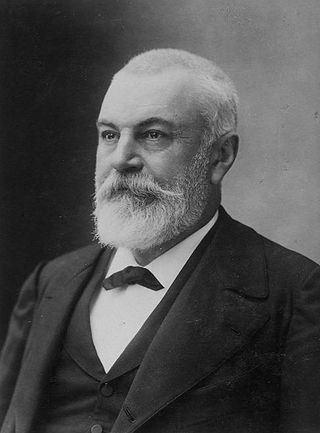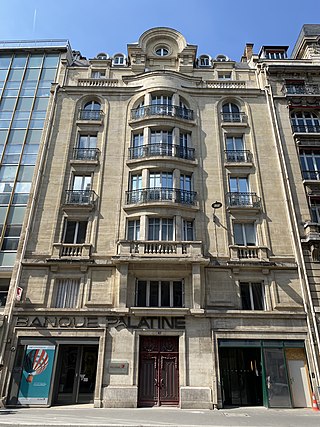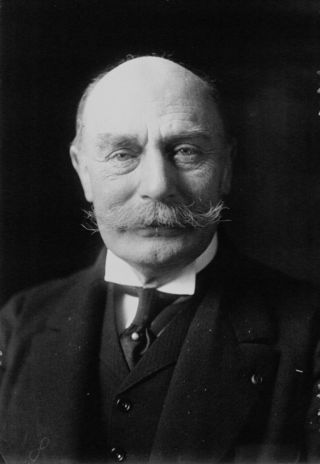
Arthur Germanovich Raffalovich (born Odessa, 1853; died Paris, 1921) was a Russian financier and economist.

Arthur Germanovich Raffalovich (born Odessa, 1853; died Paris, 1921) was a Russian financier and economist.
Raffalovich was born in Odessa in 1853, the son of a wealthy Jewish merchant, [1] Hermann Raffalovich, but the family moved to Paris when he was a child. Arthur lived most of his life in Paris, where he died on 24 December 1921. [2] His brother, Marc-André Raffalovich, was a poet and a writer on homosexuality, and his sister, Sophie, married and supported the Irish M.P. William O'Brien. [3]
He was at various times private secretary to Count Shuvalov, financial editor of the Journal des Débats , chairman of the Russian Chamber of Commerce in Paris, Commercial Attaché to the Russian Imperial Embassy in Paris, and the Russian state's financial agent in London. [4] Under Sergei Witte, he was a councillor of the State Council of Imperial Russia.
Raffalovich was a corresponding member of the Institut de France.
Besides reviews in the Journal des Économistes and an annual overview of financial markets under the title Le marché financier (1893–1920), Raffalovich wrote or contributed to the following books and reports.

Albert Auguste Gabriel Hanotaux, known as Gabriel Hanotaux was a French statesman and historian.

The Ministry of Economics, Finance and Industrial and Digital Sovereignty, informally referred to as Bercy, is one of the most important ministries in the Government of France. Its minister is one of the most prominent cabinet members after the prime minister. The name of the ministry has changed over time; it has included the terms "economics", "industry", "finance" and "employment" throughout its history.

Croissy-sur-Seine is a commune in the Yvelines department in the Île-de-France region in north-central France. It is a suburban town on the western outskirts of Paris. Many expatriates reside in Croissy, given as it is the site of The British School of Paris, one of the top ten private international schools in the world.

Yves Guyot was a French politician and economist.

The Banque Industrielle de Chine was a French bank with its main activities in China and French Indochina. It was created in 1913, expanded rapidly, but closed in 1921 because of the political context in China, causing a political controversy in France. Its activity was continued by the Franco-Chinese Bank, in China until the 1950s and in Indochina until the 1970s.

The Ottoman Bank, known from 1863 to 1925 as the Imperial Ottoman Bank and correspondingly referred to by its French acronym BIO, was a bank that played a major role in the financial history of the Ottoman Empire. By the early 20th century, it was the dominant bank in the Ottoman Empire, and one of the largest in the world.

Marc-André Raffalovich was a French poet and writer on homosexuality, best known today for his patronage of the arts and for his lifelong relationship with the English poet John Gray.

The Russo-Asiatic Bank was a major Russian bank between 1910 and 1917. It was formed in 1910 through the merger of the Russo-Chinese Bank, with activities in Russia, China and Central Asia, and the Banque du Nord, a large domestic Russian bank. By 1914, it was the largest Russian bank by total assets. In late 1917, it was nationalized by the Soviet government. Its activities in Europe and China lingered for a while, but were eventually liquidated in 1926.
Alexander Nahum Sack or Aleksandr Naumovich Zak was a jurisprudence expert and professor of Russian law, specialized in international financial legislation.
François-Xavier Joseph de Casabianca was a French aristocrat, lawyer and politician who served as minister of agriculture and commerce, minister of finance, and president of the council of state in the government of Louis Napoleon.

Adolphe Vuitry was a French lawyer, economist and politician. He became recognized as an expert on finance. He was governor of the Banque de France from 1863 to 1864, then Minister-President of the Conseil d'Etat from 1864 to 1869. In his later years he devoted himself to historical studies, publishing many works on medieval and modern finance.

Jean-Élie Gautier was a French politician who was briefly Minister of Finance in 1839.
Joseph-Antoine Castagné was a French professor at the gymnase d'Orenbourg in Orenburg, Russia, an ethnographer and an expert on Central Asia. He wrote extensively about Russian Turkestan.

Maurice Bokanowski was a French lawyer and left-wing Republican politician who served briefly as Minister of the Navy in 1924, and was Minister of Commerce and Industry in 1926–28. He rationalized tariffs and began a reorganization of aviation in France.

Joseph-Clément Garnier was a French economist and politician. He was a prolific author and a member of many learned societies. In the last years of his life he was a Senator for Alpes-Maritimes.
Raffalovich is a surname. Notable people with the surname include:

Raphaël-Georges Lévy was a French banker, economist and politician. He taught for many years at the École libre des sciences politiques. He had liberal economic beliefs, including support for free trade and central bank independence. He was a Senator of Seine from 1920 to 1927.

Jeanne Marie Labourbe was a French Bolshevik and activist who participated in the October Revolution. She died in 1919 in Odessa, executed by the police as ordered by the White Russians.

The State Bank of Morocco was a quasi-central bank established in 1907 following the Algeciras Conference, to stabilize the Moroccan currency and serve as a vehicle for European and especially French influence in the Sultanate of Morocco. Following the independence of Morocco, it was replaced in 1959 by the newly created Banque du Maroc, known since 1987 as Bank Al-Maghrib.

The Banque Française pour le Commerce et l'Industrie was a significant bank in France, formed in 1901 from two predecessor entities, the Banque Franco-Égyptienne and the Banque Française d'Afrique du Sud. It was purchased in 1922 by the Banque Nationale de Crédit, a predecessor entity of BNP Paribas.